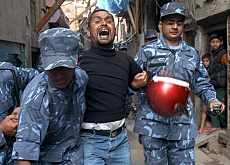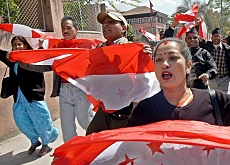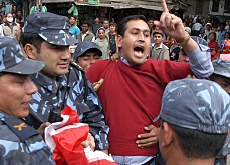UN commission adopts Nepal rights resolution

A Swiss resolution demanding that democracy and individual freedoms be re-established in Nepal has been accepted at the United Nations in Geneva.
The decision by the UN’s Commission on Human Rights comes a few days after the kingdom accepted a plan to send observers who will report on alleged rights violations.
The organisation’s top human rights body accepted the resolution on Wednesday without voting and called on Nepal to restore multiparty democracy and civil and political rights suspended under emergency measures.
The 53-nation commission also accused Nepal’s Maoist rebels of unlawful killings, rape and recruiting large numbers of child soldiers.
King Gyanendra, vowing to end a nine-year-old revolt in the impoverished Himalayan country, imposed a state of emergency on February 1, detained politicians and suspended civil liberties.
The commission called on Nepal to “reinstate immediately all civil and political rights, to cease all state of emergency related and other arbitrary arrests [and] to lift the far-reaching censorship”.
Urging an investigation, it expressed concern at allegations of violations by security forces, including “unlawful killings, all forms of sexual violence, forced displacement and disappearances”.
Observers
Swiss representatives began talks about a resolution at the beginning of the commission’s annual six-week meeting on March 14. On April 10, the Nepalese authorities and the commission agreed on the deployment of observers.
About 11,000 people have been killed in the Maoist revolt since 1996. Insurgents control large parts of the countryside and want to establish a communist republic.
According to diplomats, government abuse intensified after the king declared the state of emergency, accusing politicians of bickering amongst themselves and failing to fight the Maoists.
Switzerland dropped plans to censure Nepal after the accord. The Swiss had been leading a group of donor nations demanding a report on human rights violations.
The Nepalese government has agreed that the office of the High Commissioner for Human Rights should send observers to monitor respect for human rights in the country and help bring abusers to justice.
Switzerland is expected to provide financial and technical assistance to the observers in Nepal, who should make their report at the commission’s next session.
swissinfo and agencies
Nepal is a priority country for Swiss development aid.
Switzerland has been working for more than 40 years in the kingdom.
All programmes and projects are designed in a different manner to build up the partners’ capacity to solve their problems.
Total Swiss official development aid to Nepal was SFr21.7 million ($18.18 million) in 2003, but was reduced to SFr18.8 million in 2004.
Projects in Nepal focus mainly on good governance and peace promotion, transport infrastructure, vocational training and the promotion of small businesses, and sustainable management of natural resources.

In compliance with the JTI standards
More: SWI swissinfo.ch certified by the Journalism Trust Initiative


You can find an overview of ongoing debates with our journalists here. Please join us!
If you want to start a conversation about a topic raised in this article or want to report factual errors, email us at english@swissinfo.ch.